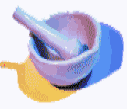 Tips for a
Friendly (Poison Free) Home
Tips for a
Friendly (Poison Free) Home
Donít leave chocolate lying
around. Approximately one-half ounce or less of baking
chocolate per pound body weight can cause problems. Even
small amounts can cause pancreatic problems.
Before purchasing
or using flea and tick products on your pet or in your
home, do some research and learn what types of flea
products are recommended for your pet. Read ALL
information before using a product on your animals or in
your home. Always follow label instructions. Also, when
using a fogger or a house spray, make sure to remove all
pets from the area for the time period specified on the
container. If you have questions about the usage of any
product, contact the manufacturer or your veterinarian
to clarify the directions BEFORE using the
product.
Be conscience of
the plants you have in your house and in the yard where
your friend plays. The ingestion of azalea, oleander,
mistletoe, sago palm, Easter lily, or yew plant
material, by an animal, could be fatal.
When cleaning
your home, be sure your baby never has access to the
area where cleaning solvents are used or stored.
Cleaning products produce a great number of
complications. There are a few that causes a mild
stomach upset, while others could cause severe burns of
the tongue, mouth, and stomach.
When deciding to
use rat or mouse baits, ant or roach traps, or snail and
slug baits, remember to place the products in areas that
are inaccessible to your pets. Most baits contain sweet
smelling inert ingredients, such as jelly, peanut
butter, and sugars, which can be very attractive to your
pet. The idea is to get rid of unwanted pest not
your best friend.
Never give your
pet any medications unless under the direction of your
veterinarian. Many drugs that are used safely in humans
can be deadly when used inappropriately. One extra
strength acetaminophen tablet (500mg) can kill a
seven-pound yorkie.
Store all
prescription and over the counter drugs out of your
pets' reach, preferably in closed cabinets. Pain
killers, cold medicines, anti-cancer drugs,
antidepressants, vitamins, and diet pills are common
examples of human medication that could be potentially
lethal even in small dosages. One regular strength
ibuprofen (200mg) could cause stomach ulcers in a
ten-pound dog.
Many common
household items have been shown to be lethal in certain
species. Miscellaneous items that are highly toxic even
in low quantities include pennies (high concentration of
zinc), mothballs (contain naphthalene or
paradichlorobenzene. one or two balls can be life
threatening in most species), potpourri oils, fabric
softener sheets, automatic dish detergents (contain
cationic detergents which could cause corrosive
lesions), batteries (contain acids or alkali which can
also cause corrosive lesions), homemade play dough
(contains high quantity of salt), winter heat source
agents like hand or foot warmers (contain high levels of
iron), cigarettes, coffee grounds, and alcoholic
beverages.
All automotive
products such as oil, gasoline, and antifreeze, should
be stored in areas away from pet access. As little as
one teaspoon of antifreeze (ethylene glycol) can be
deadly in a seven-pound puppy and less than one
tablespoon could be lethal to a 20-pound dog. Iíve
had this happen to one of my Yorkies. I rushed her
to the emergency roomÖ she survived but she was left
sterile as a result. This experience was difficult
for this baby not to mention her owner.
When treating
your lawn or garden with fertilizers, herbicides, or
insecticides, all animals need a safe place to play away
from the area until the area dries completely. Discuss
usage of products with the manufacturer of the products
to be used. Always store such products in an area that
is well out of reach of your yorkie.






